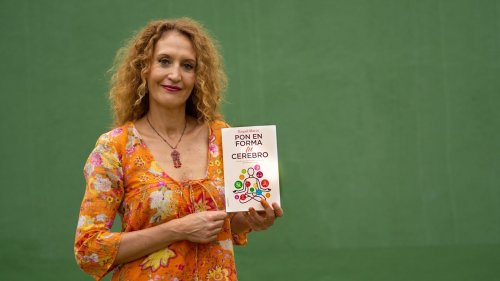Your Brain Is a "Picky Eater": The Relationship between the Brain and Gut

Learning a new language, playing an instrument, socializing, keeping a curious attitude, exercising… In order to keep your brain in shape, there are many strategies you can follow. However, in the past few years, experts have been focusing on a very special topic: the relationship between the brain and gut.
You’ve probably heard about the link between gut health and the brain. In fact, neuroscientists such as Raquel Marin highlight the communication between these two organs and their relationship with illnesses such as Alzheimer’s, fibromyalgia, or depression.
In a way, your diet is the foundation of your health, and you should pay attention to it. A healthy, agile, youthful brain, that’s ready to change and respond effectively to its environment, requires a series of very basic nutrients, such as B vitamins and natural antioxidants.

Keeping your brain in shape for a better quality of life
Is there a specific way of exercising your brain so that you can grow old in the best intellectual shape possible? Actually, there’s not just one: there are many ways to do it, and most of them have to do with paying attention to your daily habits. Expert in the matter, Raquel Marin, shows how the brain and gut are connected and how to keep your brain in shape.
Dr. Marin, neuroscientist and physiology professor at the University of La Laguna, stands out due to her work as a promoter of this matter, and especially due to her interesting publications such as her latest book Pon en forma tu cerebro (In English: Keep Your Brain in Shape). In it, she mentions the key to keeping an active and healthy brain at any age.
Just like the poet Emily Dickinson said, the brain is wider than the sky. Somehow, this fascinating organ that people often compare to a computer has many resources, processes, and potential that you probably know little about. Only experts can provide the answers and objective data that everyone should apply in their day to day life.
If you want to know how to keep your brain in shape, this interview with Dr. Raquel Marin may answer your doubts about it.
The relationship between the brain and the gut
Q. In your book Pon en forma tu cerebro (In English: Keep Your Brain in Shape), you mention that the brain is a very picky eater, why is that?
People always think about what to eat to keep their muscles, heart, or skin healthy, but they often forget that the brain doesn’t just eat anything. This organ is one of the most demanding when it comes to nutrients because it’s metabolically hyperactive: it burns lots of calories and nutrients it can’t produce. Without those, it works poorly and sooner rather than later, you start to feel it.
Q. What can you say about brain-gut communication?
In the last years, some amazing studies have confirmed that the gut can be the brain’s greatest ally or its worst enemy.
Degenerative diseases such as Alzheimer’s, Parkinson’s, autism, fibromyalgia, depression, anxiety, insomnia, multiple sclerosis, longevity, and poor physical performance are triggered early by a lack of balance in the gut bacteria.
Q. How important is water for the brain?
The two fundamental brain components are fat and water. The brain is very sensitive to dehydration. That’s why when you have a headache or you’re dizzy, you can simply rehydrate and notice intellectual well-being after a few minutes.
Q. People often confuse glucose with sugar. Can you explain the difference between the two?
Glucose is a simple molecule that’s present in basically all unprocessed foods you eat every day. Sugar is a series of various molecules, some of which are synthesized by humans in order to sweeten, preserve, and make foods more attractive. These processed sugars can damage your brain and cause inflammation.
Q. Which foods and activities are necessary to improve intellectual and creative abilities?
The best way to keep your brain in shape is to help neural communication and blood flow through the brain. Therefore, you should eat fish fat, vitamins B, C, D, and E, natural antioxidants (in colorful fruits and vegetables), iodide (in seafood), and fiber (for gut’s health) present in legumes, seeds, cereals, vegetables, and fruits.
The Mediterranean diet is one of the most neuro-healthful diets in the world, precisely because it’s rich in these foods.
Q. Which foods are best to improve sleep quality?
Tryptophan-rich foods such as cereals, nuts and seeds, lean meats, fish, fruits (banana, kiwi, plum, fig, grapefruit, melon, and tomato), and dark chocolate. This amino acid contributes to melatonin production, which is the hormone that induces sleep. It’s also convenient to avoid being in front of the computer or doing intellectually demanding activities before going to bed.
Also, try to follow a routine to relax and prepare yourself for sleep (listen to soothing music, drink chamomile tea, adjust the temperature of your room, do low-intensity activities, etc.) For example, if you go to the gym at 10 p.m., or you have meat and fries for dinner with half a bottle of wine, it’ll be harder for you to fall asleep.

Q. Finally, in your book, you dedicate a chapter to finding a balance between a frantic lifestyle and the food you should eat for your brain. What exactly can we do about it?
I suggest a combination of steps that help you combine the food for your “two brains” (your actual brain and the gut microbiota), your exercise routine, and habits that promote your brain’s activity and emotional balance.
The brain is like a set of muscles; depending on what you do, you’ll develop one part of it or the other. Knowing your brain and your gut are the best ways to get the best out of them.
Learning a new language, playing an instrument, socializing, keeping a curious attitude, exercising… In order to keep your brain in shape, there are many strategies you can follow. However, in the past few years, experts have been focusing on a very special topic: the relationship between the brain and gut.
You’ve probably heard about the link between gut health and the brain. In fact, neuroscientists such as Raquel Marin highlight the communication between these two organs and their relationship with illnesses such as Alzheimer’s, fibromyalgia, or depression.
In a way, your diet is the foundation of your health, and you should pay attention to it. A healthy, agile, youthful brain, that’s ready to change and respond effectively to its environment, requires a series of very basic nutrients, such as B vitamins and natural antioxidants.

Keeping your brain in shape for a better quality of life
Is there a specific way of exercising your brain so that you can grow old in the best intellectual shape possible? Actually, there’s not just one: there are many ways to do it, and most of them have to do with paying attention to your daily habits. Expert in the matter, Raquel Marin, shows how the brain and gut are connected and how to keep your brain in shape.
Dr. Marin, neuroscientist and physiology professor at the University of La Laguna, stands out due to her work as a promoter of this matter, and especially due to her interesting publications such as her latest book Pon en forma tu cerebro (In English: Keep Your Brain in Shape). In it, she mentions the key to keeping an active and healthy brain at any age.
Just like the poet Emily Dickinson said, the brain is wider than the sky. Somehow, this fascinating organ that people often compare to a computer has many resources, processes, and potential that you probably know little about. Only experts can provide the answers and objective data that everyone should apply in their day to day life.
If you want to know how to keep your brain in shape, this interview with Dr. Raquel Marin may answer your doubts about it.
The relationship between the brain and the gut
Q. In your book Pon en forma tu cerebro (In English: Keep Your Brain in Shape), you mention that the brain is a very picky eater, why is that?
People always think about what to eat to keep their muscles, heart, or skin healthy, but they often forget that the brain doesn’t just eat anything. This organ is one of the most demanding when it comes to nutrients because it’s metabolically hyperactive: it burns lots of calories and nutrients it can’t produce. Without those, it works poorly and sooner rather than later, you start to feel it.
Q. What can you say about brain-gut communication?
In the last years, some amazing studies have confirmed that the gut can be the brain’s greatest ally or its worst enemy.
Degenerative diseases such as Alzheimer’s, Parkinson’s, autism, fibromyalgia, depression, anxiety, insomnia, multiple sclerosis, longevity, and poor physical performance are triggered early by a lack of balance in the gut bacteria.
Q. How important is water for the brain?
The two fundamental brain components are fat and water. The brain is very sensitive to dehydration. That’s why when you have a headache or you’re dizzy, you can simply rehydrate and notice intellectual well-being after a few minutes.
Q. People often confuse glucose with sugar. Can you explain the difference between the two?
Glucose is a simple molecule that’s present in basically all unprocessed foods you eat every day. Sugar is a series of various molecules, some of which are synthesized by humans in order to sweeten, preserve, and make foods more attractive. These processed sugars can damage your brain and cause inflammation.
Q. Which foods and activities are necessary to improve intellectual and creative abilities?
The best way to keep your brain in shape is to help neural communication and blood flow through the brain. Therefore, you should eat fish fat, vitamins B, C, D, and E, natural antioxidants (in colorful fruits and vegetables), iodide (in seafood), and fiber (for gut’s health) present in legumes, seeds, cereals, vegetables, and fruits.
The Mediterranean diet is one of the most neuro-healthful diets in the world, precisely because it’s rich in these foods.
Q. Which foods are best to improve sleep quality?
Tryptophan-rich foods such as cereals, nuts and seeds, lean meats, fish, fruits (banana, kiwi, plum, fig, grapefruit, melon, and tomato), and dark chocolate. This amino acid contributes to melatonin production, which is the hormone that induces sleep. It’s also convenient to avoid being in front of the computer or doing intellectually demanding activities before going to bed.
Also, try to follow a routine to relax and prepare yourself for sleep (listen to soothing music, drink chamomile tea, adjust the temperature of your room, do low-intensity activities, etc.) For example, if you go to the gym at 10 p.m., or you have meat and fries for dinner with half a bottle of wine, it’ll be harder for you to fall asleep.

Q. Finally, in your book, you dedicate a chapter to finding a balance between a frantic lifestyle and the food you should eat for your brain. What exactly can we do about it?
I suggest a combination of steps that help you combine the food for your “two brains” (your actual brain and the gut microbiota), your exercise routine, and habits that promote your brain’s activity and emotional balance.
The brain is like a set of muscles; depending on what you do, you’ll develop one part of it or the other. Knowing your brain and your gut are the best ways to get the best out of them.
This text is provided for informational purposes only and does not replace consultation with a professional. If in doubt, consult your specialist.







